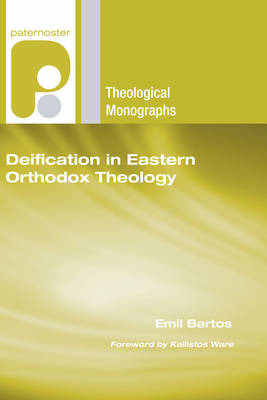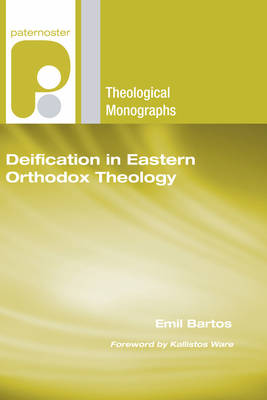
- Retrait gratuit dans votre magasin Club
- 7.000.000 titres dans notre catalogue
- Payer en toute sécurité
- Toujours un magasin près de chez vous
- Retrait gratuit dans votre magasin Club
- 7.000.0000 titres dans notre catalogue
- Payer en toute sécurité
- Toujours un magasin près de chez vous
Description
In recent years, Eastern Orthodox thought has had an increasing influence on key aspects of contemporary Western Christian thought, particularly as regards the doctrine of the Trinity and mystical spirituality. However, the foundations and fundamental presuppositions of Eastern Christianity's theological system have remained largely unstudied -- and thus unknown -- in the West. In this important study, Emil Bartos examines the doctrine of deification which provides the conceptual basis for the way Staniloae and other Orthodox theologians understand the major doctrines of the Christian faith. The idea that God became man that man might become God sounds almost heretical to many Western ears, yet this affirmation is repeated countless times in the writings of the Eastern Fathers. Beginning with the apophaticism that lies at the heart of Eastern theology, Bartos examines each of the key doctrines of anthropology, christology, soteriology and ecclesiology as they relate to deification in Staniloae's thought. Bartos' study represents not merely a contribution to contemporary dialogue between Eastern and Western theologians, but also a much needed introduction to an aspect of Christian thought down the centuries that is largely neglected in the Christian West. 'Emil Bartos has provided a fine and thorough study of the theology of Staniloae, the Romanian scholar-priest, and so fills a gap for the English readership. The concept of deification, too easily misunderstood in the West, gains sympathetic exposition in this authoritative guide.' - Timothy Bradshaw, Senior Tutor, Regent's Park College, Oxford 'This is a book which deserves to be widely read and pondered throughout the English speaking world. It deals with one of the most important themes in Orthodox theology and shows what substantial and constructive contributions towards the work of Christian understanding and unity are coming from the Balkan countries.' - A.M. Allchin, Bangor University, North Wales 'This is a splendid and thorough introduction to the work of a leading Orthodox theologian, and it is long overdue.' - Oliver Davies, University of Wales Emil Bartos is Dean of Theology at Emanuel University in Oradea, Romania, where he teaches systematic and comparative theology and the history of dogma. His doctoral research was carried out under the supervision of the Orthodox Bishop Kallistos Ware (Professor of Theology at the University of Oxford) and the Catholic Theologian Oliver Davies (of the University of Wales).
Spécifications
Parties prenantes
- Auteur(s) :
- Editeur:
Contenu
- Nombre de pages :
- 398
- Langue:
- Anglais
- Collection :
Caractéristiques
- EAN:
- 9781597527927
- Date de parution :
- 01-01-07
- Format:
- Livre broché
- Format numérique:
- Trade paperback (VS)
- Dimensions :
- 153 mm x 229 mm
- Poids :
- 553 g

Les avis
Nous publions uniquement les avis qui respectent les conditions requises. Consultez nos conditions pour les avis.






